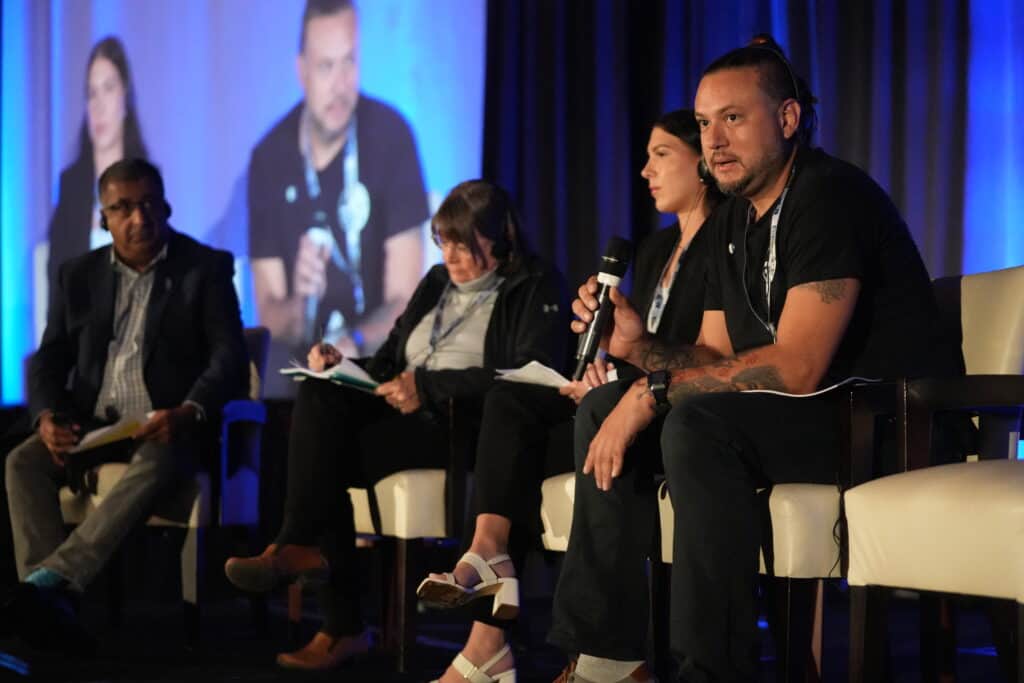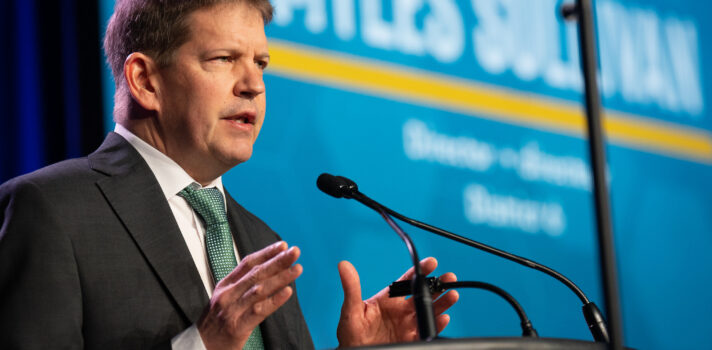The Justice 2024 conference began today with a moving blessing by Claudette Commanda, Algonquin Elder, Indigenous rights activist and Chancellor at the University of Ottawa. Elder Commanda reminded us about the ways that life itself is a blessing. She encouraged delegates to continue working for justice.
“Without justice, will there be healing, will there be equity? Without justice, will there be a good day and a better day tomorrow, in the future?” asked Commanda to the conference delegation. “Keep on working for justice. Keep on doing that good work.”
The Justice conference covers the areas of health and safety, the environment and human rights.
District 5 Director Dominic Lemieux spoke about having a broad understanding of the concept of justice, including extending our union militancy to the issue of temporary foreign workers, who are often exploited with little hope of being able to stay as permanent residents and citizens.
“We’re going to continue to need workers from elsewhere, in our regions, in our businesses,” said Lemieux.
“But the need is permanent, not temporary. Jobs are permanent, not temporary… We want brothers and sisters from all over the world, free to go and work wherever they want, with all the freedom they need to demand the best possible working conditions. Men and women who will be able to settle down for real, with their families… To live fully, with all the rights of citizens.”
National Director Marty Warren provided an overview of key health and safety, environment and human rights initiatives across the union, including the revamped Stop the killing, enforce the law Westray campaign, the Raising the bar on women’s health and safety campaign, the National Anti-Racism Committee, the National Indigenous Committee and the National Steel Pride working group.
“Some of the most complex and challenging work that we face as justice activists is related to the climate and environmental problems that are becoming more pressing, each day,” said Warren.
“We can’t shy away from these challenges and that’s why our union is at the forefront of the intersection between decarbonization and good jobs. We know we can have a future with good resource and manufacturing jobs, while we build a cleaner and sustainable economy.”
The conference also heard from Janice Hobbs Martell, founder of the McIntyre Powder Project and her inspiring efforts in taking on WSIB about compensation claims of the connection between aluminum powder exposure and neurological diseases.
In January 2022, thanks to the many years of advocacy, Parkinson’s disease became an occupational disease as per the WSIB – therefore claims for compensation, based on workplace exposures were no longer automatically denied. As part of the project, Martell has a registry of 676 miners for whom the project can contact and track – representing a mere 2.4% of Ontario miners alone.
A panel about migrant workers and the struggle for decent work on a warming planet broke down the challenging circumstances of migrant workers face and the many ways that they are far too vulnerable under our current legislative framework.
Panelists included Bessie Hodder (Horizons of Friendship), Ronald Carvajal (USW Local 9471), District 5 and Denise Gagnon (Réseau d’aide aux travailleuses et travailleurs migrants agricoles du Québec), moderated by Mike Duhra, assistant to the District 3 Director.
“After several years as a temporary foreign worker, I wanted to apply for permanent residency to eventually become a citizen,” said Ronald Carvajal. “It was difficult because I worked nights and finished at 5-6 a.m. and had to be at my French classes by 1 p.m. to apply. I finally obtained permanent residency and have been a citizen since 2023.
There are workers on closed permits, who have been here for several years, who now have family and friends here, and who don’t know when they’ll be forced to return to their country.”
Later that morning, Sherbrooke University professor François Delorme spoke about the many ways that climate change is a union issue, including the fact that the globe is warming at a rate that even surprised climate scientists this past year.
“We won’t be able to solve the problems of inequality and climate change without cooperation and solidarity. This solidarity must also apply between generations.”
Capping the session was an informative panel on the Stop the killing campaign and why it remains relevant to this day. Panelists included Glenn Nolan (USW Local 9316), Frank Crowder (USW Local 7135), Brian O’Rourke (USW Local 1-2017), Nicolas Lapierre (assistant to the Director, District 5), Sylvia Boyce (Health, Safety & Environment Department Leader), moderated by District 3 Director Scott Lunny.
Glenn Nolan spoke about the shocking explosion at the Come By Chance refinery in Newfoundland that left one member dead and several others badly injured.
Brian O’Rourke spoke about the devastating Lakeland and Babine sawmill explosions where a fatal explosion and fire ripped through the mill killing and injuring members.
Sylvia Boyce talked about the calls to action of the revamped Stop the killing campaign, including greater training for and coordination between law authorities to ensure workplace deaths are properly investigated and prosecuted using a criminal lens, as appropriate.
In the afternoon, conference delegates took part in a series of informative, skills-building workshops which will extend all day tomorrow.
Check out photos from day 1!
Share on Facebook



